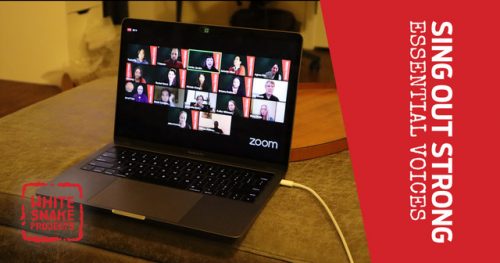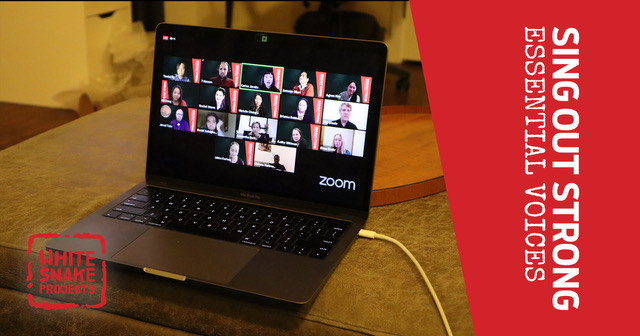 United States Sing Out Strong: Essential Voices: Carami Hilaire (soprano), Sarah Coit (mezzo-soprano), Agnes Kim (cello), Nathan Ben-Yehuda (piano). Boston, 19.12.2020. (RP)
United States Sing Out Strong: Essential Voices: Carami Hilaire (soprano), Sarah Coit (mezzo-soprano), Agnes Kim (cello), Nathan Ben-Yehuda (piano). Boston, 19.12.2020. (RP)

Production:
Moderator – Cerise Lim Jacobs
Music Director – Tian Hui Ng
Audio Engineer – Jon Robertson
Broadcast Engineer – James Ruth
Stage Manager – Miguel Flores
Production Manager – Taylor Hansen
Program:
Eric Delgado/Geovanna de Andrade – ‘A Teaching Aide’s Heartache’
Matt Frey/Veronica Rua – ‘I Have a Bag Full of Dreams’
Patrick Holcomb/Felino Taruc – ‘Who Will Care for the Children?’
Michael Ippolito/Andrea Rocha – ‘The Privilege of Witnessing the Last Breath’
Breezy Love/Melhim Bou Alwan – ‘Caring for our Co-workers
Jerod Tate/Sophina Calderon – ‘Hozhó’
Dylan Tran/Chiruza Mohammed – ‘My Life after Corona’
XiRen Wang/Sandy Piao – ‘Kitchen Melody’
Stefan Weisman/Edward Rippe – ‘Crack, Crack’
Marina Lopez/Trevor Tom – ‘Neither Snow nor Rain’
I sat in the middle of the front row at Alice Tully Hall for the premiere of The AIDS Quilt Songbook on 4 July 1992. The friend next to me joked that we would be in every press photograph of the concert, but we weren’t. I don’t have the slightest recollection that it was the Fourth of July, although I distinctly recall it being a warm summer evening in New York.
Baritone William Parker spearheaded that enterprise which featured 18 songs with texts and music by American poets and composers. Parker, who died of AIDS the following year, wanted the writers and composers to take risks and tackle the real stuff: the despair, the side effects from experimental drugs, the night sweats, the horror of dying alone from obscure diseases of which no one had ever heard but that were now fatal.
Twenty-eight years later we are in the midst of another pandemic. Alice Tully Hall is dark, as is every concert hall in New York and much of the world. It was a cold, wintry night with snow on the ground, yet I could watch White Snake Projects’ Sing Out Strong: Essential Voices safely at home on a fifty-inch screen. This triumph of artistry and technology zeroed in one of our most pressing challenges – the isolation that besets so many. The AIDS Quilt Songbook was a communal celebration, as defiant and fun as it was poignant, while Sing Out Strong: Essential Voices found me at home, watching the performance alone.
The Essential Workers who shared their experiences on the front lines of the COVID-19 pandemic, the writers who fashioned them into poetry, the composers and technical wizards who made the concert possible were in different locations across the country. Even these digital masters occasionally forgot to unmute themselves or make the right patch to be heard. It was a lesson in not sweating the small stuff. The musical elements, however, were perfectly synchronized.
Cerise Lim Jacobs, an immigrant woman of color and the founder of the activist opera company White Snake Projects, was the moderator. Her upbeat mood and delivery were in stark contrast to the earnestness of her two-fold message: first, the stories of the people who not only save lives, care for the dying, make life possible for the rest of us and keep so many of us safe must be heard; and second, this concert was live, with absolutely nothing recorded.
Just as the First Responders who raced to aid others on 9/11 were the heroes of that terrible day, so Essential Workers are to this crisis. The voices heard in Sing Out Strong: Essential Voices are those of medical personnel, hospital housekeepers, grocery store workers, delivery people and others detailing what they do, how they’ve been coping, their hopes, their fears, their families and their despair – anything they’re moved to write about.
Many of the voices heard in Sing Out Strong: Essential Voices are those of immigrants. Melhim Bou Alwan, a physician, cried when he realized he would not see his family in Lebanon for some time to come, but focused on his patients and caring for his co-workers to keep him strong. Veronica Rua, who arrived from Columbia with a bag full of dreams, now works at Massachusetts General Hospital cleaning the areas frequented by infected people. She was infected with COVID and passed it on to her husband and five-year-old son. As a survivor, Rua feels as if she were reborn and cherishes the gift of life more than ever.
Chiruza Mohammed is a young man from the Congo who attends school by day and then works an eight-hour shift. He hid his pain from his mother by wearing a mask when they spoke; one of his roommates died and he too caught the virus. Jacobs interviewed her mailman, Trevor Tom, originally from Trinidad, who loves his job and believes in America. COVID and politics have been added to the postal worker’s creed: ‘Neither snow nor rain nor heat nor gloom of night stays these couriers from the swift completion of their appointed rounds’.
‘Crack, Crack’ is the sound that Edward Rippe heard as he tried unsuccessfully to resuscitate a patient with COVID. An internal medicine resident physician at NYC HHC Woodhull Hospital and Mental Health Center in Brooklyn, Dr. Rippe became sick with COVID-19 but returned to work after one week. Andrea Rocha, a pediatric nurse, volunteered to work in the COVID ward as the need was so great. Her mission is to ensure that her patients do not die alone when they cannot connect with a family member.
Felino Taruc is a flight nurse who transports COVID patients from the Four Corners and Navajo Nation. She recalls bringing an elderly man to the same hospital as his wife. When she learns that their son has died, she wonders who will now care for his children as their grandmother looked after them. Sophina Calderon, also a member of the Navaho Nation, is a doctor working in Tuba City, AZ, the community in which she was raised. She invokes the Navaho word ‘Hozhó’, which means to be at one with and a part of the world around you, to describe the sense of loss as she witnesses the deaths of so many family members and friends.
In ‘A Teaching Aide’s Heartache’, Geovanna de Andrade ponders the irony of living in the most powerful country in the world yet feeling small and scared, while yearning for the perfume of Cape Verde. As poignant as any of the stories of those who worked on the front lines during the pandemic was ‘Kitchen Melody’, in which chef Sandy Piao reflects on being non-essential: ‘I am still a chef, and I can feed.’
White Snakes Projects does many things, including serving as an incubator of young composers. The ten who set these words to music gave of themselves. If their stylist default was often more narrative than lyrical melodies, it is what the words demanded. The performers – soprano Carami Hilaire, mezzo-soprano Sarah Coit, cellist Agnes Kim and pianist Nathan Ben-Yehuda – performed with the passion and commitment worthy of the experiences and dreams that they conveyed with their voices and instruments.
Tickets for this concert were free. Voluntary contributions were solicited to support the Coronavirus Response Fund for Nurses.
Rick Perdian
To read the stories of the Essential Workers, click here.
